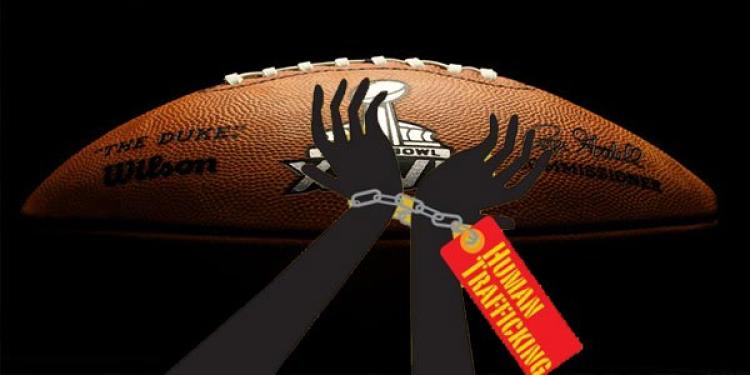Does the Super Bowl Bring an Increase in Sex Trafficking?
Posted: January 30, 2015
Updated: January 11, 2022
American gambling laws and prostitution/trafficking laws are very difficult to enforce

Conventional wisdom is that the Super Bowl brings an increase in prostitution and sex trafficking. City officials in Phoenix certainly think so.
“The Super Bowl is the greatest show on Earth, but it also has an ugly underbelly. It’s commonly known as the single largest human trafficking incident in the United States.”
• Forbes reported that 10,000 prostitutes were trafficked into Miami for the 2010 Super Bowl
• NYPD cracked down on prostitution in advance of the Super Bowl in 2014
• Phoenix, Arizona is looking to curb prostitution during Super Bowl XLIX
Texas Attorney General Greg Abbott told this to USA Today in January, 2011, just prior to the Super Bowl being played in Dallas. The apparent uptick in prostitution immediately before, during, and after the Super Bowl each year has been well documented.
According to Forbes, 10,000 prostitutes were trafficked into Miami in 2010 when the game was held there. Even more terrifying, 133 arrests for underage prostitution were made on the night of the Super Bowl in Dallas. According to federal law, prostitution of a minor is considered trafficking.
Last year’s Super Bowl, which was played in New Jersey but brought thousands of tourists into New York City as well, received major attention from the media and anti-trafficking groups. The NYPD made 298 arrests for prostitution during the first three weeks of January. In Manhattan, which generally sees about 300 such arrests per year, there were 100 in a single week.
What causes the increase?
The believed connection between the Super Bowl and prostitution is driven by a few factors. The first is that the big game always brings an influx of tourists, mostly male, into the host city. The 2011 Super Bowl in Dallas was the most attended game on record; more than 102,000 fans were in attendance.
On top of those who buy tickets the game, tens of thousands more fly to watch the game in local bars and restaurants. When a city agrees to host the Super Bowl, it is accepting responsibility for policing large crowds of men in an anonymous setting where drinking is widespread.
The lifestyle of a Super Bowl attendee isn’t all that different from gambling lifestyle. Testosterone levels are high. Inhibitions are low.

Some of the thousands of visitors choose to partake in prostitution, and until the issue came to light in recent years, not enough police to deal with the influx of people.
Will Phoenix be a hotbed for sex trafficking during Super Bowl XLIX?
Arizona Attorney General Mark Brnovich has made combatting sex trafficking a top priority for the state. He has worked on an initiative to amend laws to stiffen the penalty for trafficking another person, as well as campaigned to raise awareness about the issue.
Brnovich has appeared at numerous public functions with Cindy McCain, wife of Arizona Senator John McCain. The two, in collaboration with former Governor Jan Brewer, have also sought to remove advertisements for prostitution.
City officials in Phoenix, Arizona are taking the issue especially seriously, as they will host the Super Bowl on February 2. The city’s Human Trafficking Task Force recently gave its recommendations for curbing sex trafficking and prostitution at a special city council meeting on January 14.
The task force plans to combat prostitution with saturation policing and a more vigorous approach. According to Deputy City Manager Deanna Jonovich, a member of the task force, police will institute a mandatory booking policy.
“This would mean the individual would go through the booking process, they would sit in the cell until they are able to appear before the judge — this could be anywhere from 10 to 24 hours,” Jonovich said.
In Jonovich’s view, mandatory booking would “send the message that the City of Phoenix will not tolerate sex trafficking or prostitution.” There are questions as to how effective this will be, as well as what purpose it will serve.
Is an aggressive arrest policy effective?
Anti-trafficking advocates argue that sex workers should be treated as victims, not criminals, and that booking them does nothing to save them from their predicament. Kate Mogulescu, the founder of the Trafficking Victims Advocacy Project at the Legal Aid Society, is highly critical of the approach Phoenix is taking:
I know firsthand the devastating consequences that aggressive arrest practices can have for both trafficked and nontrafficked people engaging in prostitution. Many, but not all, of our clients are, in fact, trafficked, and many more have survived an extensive amount of brutality, violence and trauma. Turning them into defendants and pushing them through the criminal justice system contradicts any claim of assistance.
There are also many who argue that the uptick in prostitution during the Super Bowl is illusory. Statistics prove that arrests for prostitution and trafficking go up. But that doesn’t actual prove that there are more instances of prostitution. Said Mogulescu: “These arrests are not indications of an increase in prostitution activity, but rather of an increase in policing.”
Concluding thoughts
American gambling laws and prostitution/trafficking laws show a lot of similarity. They are almost impossible to enforce in a systematic, coherent manner. Whether the connection between the Super Bowl and sex trafficking is real or not, we can expect a big increase in prostitution-related events in Phoenix this year. Whether that will be successful in protecting trafficked women from abuse and exploitation, is much more doubtful.












